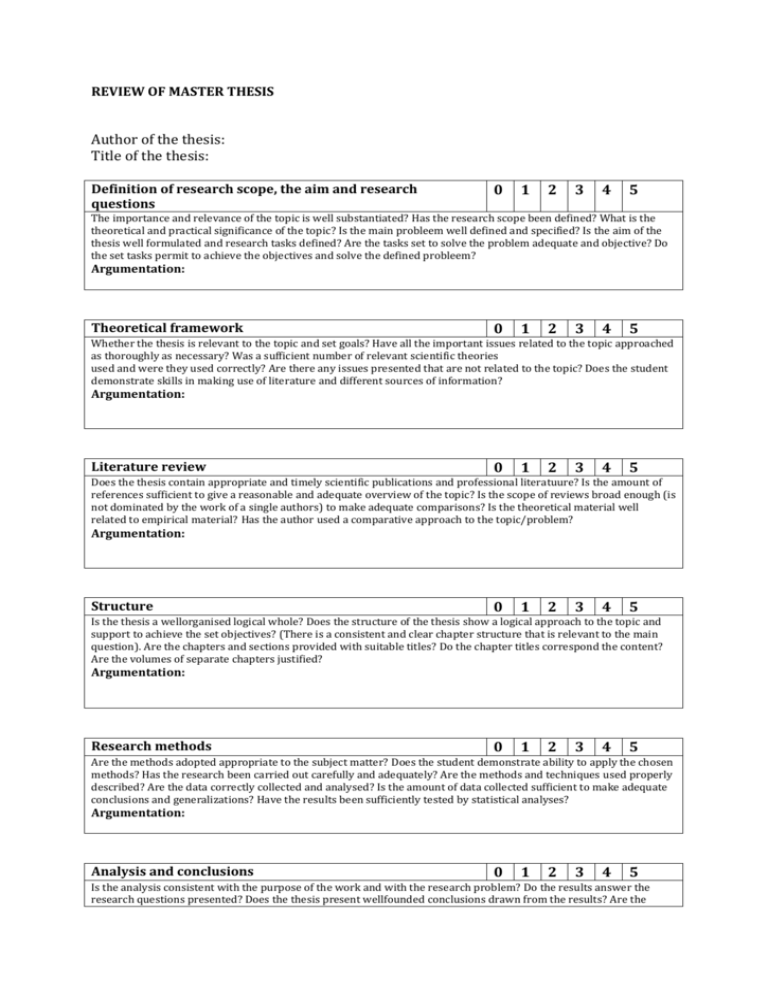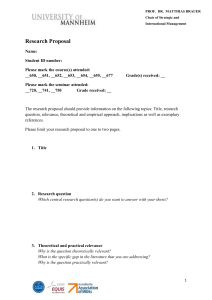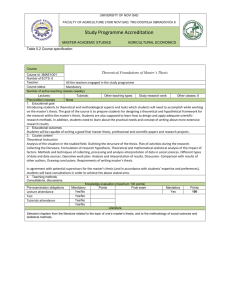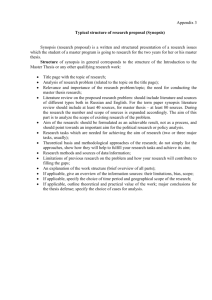review of master thesis
advertisement

REVIEW OF MASTER THESIS Author of the thesis: Title of the thesis: Definition of research scope, the aim and research questions 0 1 2 3 4 5 The importance and relevance of the topic is well substantiated? Has the research scope been defined? What is the theoretical and practical significance of the topic? Is the main probleem well defined and specified? Is the aim of the thesis well formulated and research tasks defined? Are the tasks set to solve the problem adequate and objective? Do the set tasks permit to achieve the objectives and solve the defined probleem? Argumentation: Theoretical framework 0 1 2 3 4 5 Whether the thesis is relevant to the topic and set goals? Have all the important issues related to the topic approached as thoroughly as necessary? Was a sufficient number of relevant scientific theories used and were they used correctly? Are there any issues presented that are not related to the topic? Does the student demonstrate skills in making use of literature and different sources of information? Argumentation: Literature review 0 1 2 3 4 5 Does the thesis contain appropriate and timely scientific publications and professional literatuure? Is the amount of references sufficient to give a reasonable and adequate overview of the topic? Is the scope of reviews broad enough (is not dominated by the work of a single authors) to make adequate comparisons? Is the theoretical material well related to empirical material? Has the author used a comparative approach to the topic/problem? Argumentation: Structure 0 1 2 3 4 5 Is the thesis a wellorganised logical whole? Does the structure of the thesis show a logical approach to the topic and support to achieve the set objectives? (There is a consistent and clear chapter structure that is relevant to the main question). Are the chapters and sections provided with suitable titles? Do the chapter titles correspond the content? Are the volumes of separate chapters justified? Argumentation: Research methods 0 1 2 3 4 5 Are the methods adopted appropriate to the subject matter? Does the student demonstrate ability to apply the chosen methods? Has the research been carried out carefully and adequately? Are the methods and techniques used properly described? Are the data correctly collected and analysed? Is the amount of data collected sufficient to make adequate conclusions and generalizations? Have the results been sufficiently tested by statistical analyses? Argumentation: Analysis and conclusions 0 1 2 3 4 5 Is the analysis consistent with the purpose of the work and with the research problem? Do the results answer the research questions presented? Does the thesis present wellfounded conclusions drawn from the results? Are the results of the research and conclusions clearly and logically presented? Is a comparison made between the results and published data? Are the results placed in a broader context? Are generalisations supported by facts? Argumentation: Appearance of the thesis 0 1 2 3 4 5 Is the overall appearance of the thesis appropriate? Are the given formatting rules and guidelines been followed (the formatting of tables, figures and drawings)? (For general guidance on formatting the student has to follow APA style) Has the student followed the basic rules of citation and referencing? Is the thesis written in coherent, formal style?.Does the thesis contain any grammatical or spelling errors that complicate reading? Is the use of definitions and concepts correct? Argumentation: Summary of evaluation 0 1 2 3 4 5 (The total grade will be based on previous evaluations) Is the thesis written in compliance with norms for academic and scholarly expression, does it meet the requirements for master thesis? What is the level of work (as assessed by the novelty of the approach,the theoretical and practical importance of presented views and proposals in the work)? What are the strengths of the work? Does the thesis make an original contribution to the practical knowledge within the field of study? What kind of substantive errors and deficiencies (if there are any) should be considered important in evaluating the work? What can be considered the author's contribution? The reviewer’s observations and suggestions: Questions to the defender 1. 2. 3. Reviewer (incl. titles): Signature: Date of review: Grading criteria Grade Research Problem Challenge Definition and limiting Freshness of research and its point of view Theoretical Part Relevance of the theoretical framework Accuracy of concepts, assumptions and hypotheses Mastery of relevant literature Use of sources Methods/Empirical Part/ Material Choice of methods Methods for collecting the material Representativeness of the material Command of methods needed in the analysis Presenting the material in an explicit form Connection between the analysis and theory Research Results Results, presenting, evaluating and interpreting the results Drawing conclusions Meeting the objectives of the research General Evaluation Coherence, structure’s clarity and command of the process Researcher’s personal contribution to the work Presentation Use of references, use of tables, relevance of the bibliography and appendices, linguistic form, finishing touch and layout 5 Genuinely challenging and innovative research topic, adequate limiting of the subject, accurately defined and well reasoned research problem, fresh point of view Deep knowledge of theories, well reasoned theoretical starting point, clear comprehension of concepts, critical use of sources, extensive discussion, clear and in-depth analytical approach. Justified choice of method, excellent command of methods, extensive and relevant material, deep, thorough and systematic handling of the material, clear connection to the theoretical framework. New and interesting results are produced in the research. Research objectives are met. Conclusions are innovative and professional. Readable, stylistically excellent text; structure is clear and consistent, layout flawless Thesis illustrates maure and creative thinking, analytical approach – a genuine researcher’s point of view. Interesting and fresh research topic, well reasoned limiting of the subject, accurate definition of the research problem and appropriate point of view Credible theoretical skills, viable theoretical starting point of the work, skilful use of concepts, well argused discussion, credible use of sources, good overall image. Viable choice of method, good methodological skills, extensive and appropriate material, discussion accurate, connection to the theory clear. New results are produced in the work. Objectives of the research are met. Conclusions are clear and justified in a creative way and indicate good com mand of the topic. Readable, stylistically appropriate text, flawless language, clear and consistent structure, layout flawless. The thesis illustrates creative thinking and capability of independ ent thinking and understanding Research topic Good knowledge Work is done Results are Relatively fluent 4 3 relatively interesting and fresh. Definition viable, appropriate limiting of the topic. of theories, essential concepts comprehended, assumptions and hypotheses in line with the definition of the research problem, source material relatively extensive, sources are used appropriately. correctly methodologically and the empirical part is completed faultlessly. Material is fairly epresenting. Connection between the analysis and the theory. objectively put, potential for interpretation is well deployed, and objective of the research is fulfilled. text, stylistically fairly readable, language fairly flawless. Clear structure, layout decent. The thesis illustrates good command of the techniques needed in doping research. 2 Research topic fairly conventional, definition relatively clear, point of view customary. Theoretical framework somewhat unclear and narrow. Concepts, hypotheses and assumptions defined partly in a clear way. Amount of relevant literature comparatively low. Genuinely critical touch is missing. Methodological choice fairly justifiable, method applied mechanically, problems with the compatibility of method, material and research problem. Handling of the material partly unbalanced. Research questions are partly unanswered, potential for interpretation partly left unused. Conclusions fairly simple. Relatively readable text, style sometimes obscure. Inconsistencies in the thesis, structure not always justified, personal input comparatively low. Ambiguity in the use of references. 1 Research topic conventional, insufficient limiting leaves the topic unclear, considerable inconsistency in the definition. Theoretical framework narrow. Insufficient definition of concepts, assumptions and hypotheses remain vague and their links to the topic are not viable. Limited literature, possibly only domestic sources. Problems with critical approach to sources. Method impossible to justify and/or apply. Problems with methodological skills make the handling of material difficult. Unprocessed material impedes the analysis. Problems with conjoining analysis and theory. Research results questionable, simple or inadequate. Problems with meeting the research objective. Conclusions are missing or do not correspond to the purpose of the study. Considerable inconsistencies in the thesis, structure not justified, text clumsy, language unfinished in places, deficiencies in references, attention not paid to technicalities, layout unfinished.








